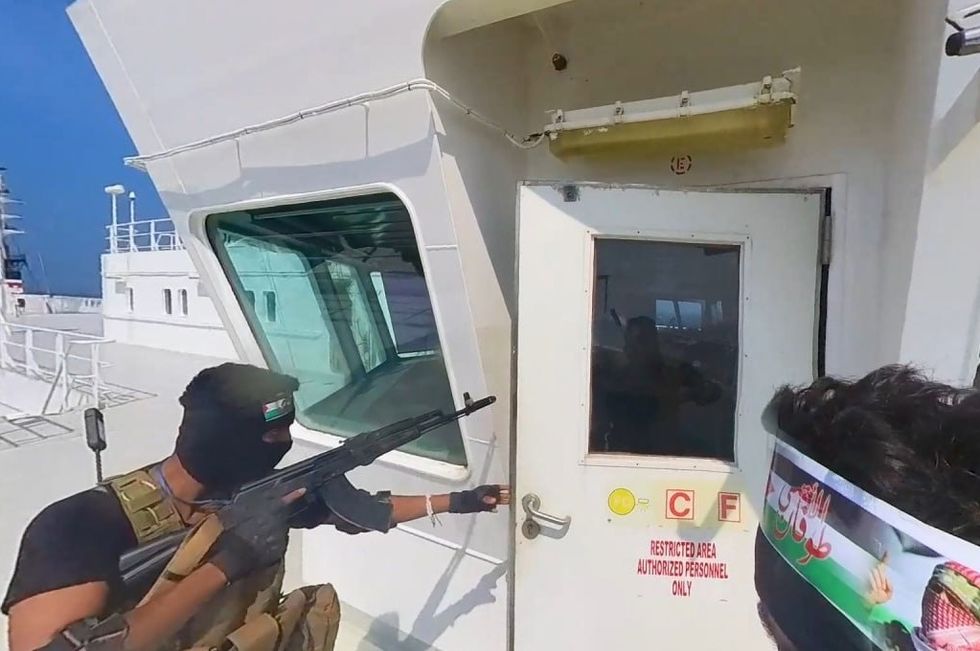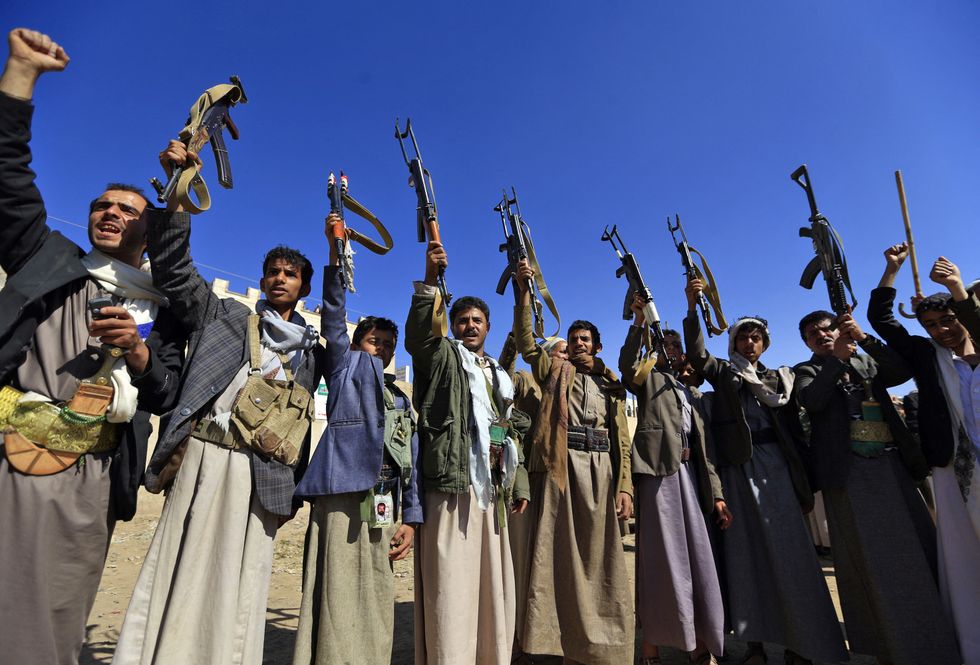Britain issues warning to Red Sea rebels: UK ready to take ‘direct action’
Defence Secretary says airstrikes on Yemen targets would be part of response
Don't Miss
Most Read
Trending on GB News
Defence Secretary Grant Shapps has confirmed that Britain was prepared and willing to launch airstrikes on Houthi rebels in Yemen over their attacks on commercial shipping in the Red Sea.
Writing in the Daily Telegraph, Shapps said that Britain is willing and ready to deter the armed group, which is backed by Iran.
“The Houthis should be under no misunderstanding: We are committed to holding malign actors accountable for unlawful seizures and attacks.”
Shapps’s warning comes a day after US helicopters destroyed three Houthi small boats after responding to a distress call by a commercial tanker.

A screen grab captured from a video shows that cargo ship 'Galaxy Leader', co-owned by an Israeli company, being hijacked by Iran-backed Houthis from Yemen in the Red Sea on November 20
GETTY
The US Navy said it killed at least 10 rebels as they attempted to board the ship. The Houthi militia reportedly shot at the helicopters before they were engaged by US forces.
Shapps said: “Those terrorists who are disrupting trade in the Red Sea are drinking in the last chance saloon. Diplomatic efforts have been made to find a resolution but with limited success.”
The Royal Navy has deployed HMS Diamond, a type 45 destroyer, to the Gulf since November. Last month, it shot down a Houthi attack drone, which the Ministry of Defence said was the first time the navy had shot down an aerial target in anger for decades.
The Iran-backed Houthis started to launch rockets and drones towards Israel in the second week of the conflict in October and has shifted to focussing more intensely on Red Sea activity.
If the Red Sea was not protected, Shapps said that “it risks emboldening those looking to threaten elsewhere including in the South China Sea and Crimea.”
He added that the situation was “a test for the international community” and that the UK needed to “stand firm with our allies.”

Defence Grant Shapps
GETTY
The Red Sea shipping route is vital for the British economy, with some 12 per cent of global trade passing through the Bab El Mandeb Strait.
Further north up the Red Sea, the Strait of Hormuz - dubbed the world's most important oil artery - has been the scene of several Houthi rocket attacks since the Israel-Hamas war commenced on October 7.
Iranian hardliners have threatened to close the strait if Washington intervenes further in the conflict.
Twelve international shipping firms have diverted goods away from the Red Sea passage since the conflict erupted, adding 5,000 miles to journeys detouring around Africa, which could spark a second cost of living crisis and additional inflationary pressures.
Duncan Schofield, Risk Director at security firm TKC, told GB News that “disruption of the Red Sea shipping lanes poses significant economic and environmental threats, including potential oil price hikes and catastrophic damage if an oil tanker were hit.”
Schofield warned that there are “numerous uncertainties” surrounding a possible UK intervention in Yemen.

Armed Yemeni men brandish their weapons as they gather in the capital Sanaa to show their support to the Shiite Huthi movement against the Saudi-led intervention
GETTY
“What if UK service personnel are killed, or if the UK causes civilian casualties? Will there be the political will to escalate or will we see another embarrassing climbdown such as in Syria?
He added: “These tensions also risk fuelling radicalisation and increasing the likelihood of terror attacks on UK soil, as they provide recruitment and empowerment rhetoric for extremist narratives.
“The UK and its allies must carefully balance the imperative of maintaining open sea lanes with the broader implications of their actions. A comprehensive strategy that prioritises limited intervention by a multilateral force, increased diplomatic efforts and seeks to address the root causes of regional instability is the only solution.”
The Iran-backed Houthis overthrew a Saudi-backed government in Yemen in 2014, sparking a devastating civil war. The UN has described the country as enduring the most acute humanitarian crisis in the world. Hundreds of thousands have been killed and over 80 per cent of the population relies on aid to survive.
The Houthis have successfully launched rocket and drone attacks on key Saudi infrastructure, including airports and energy facilities.
Chris Doyle, director of the Council for Arab-British Understanding, told GB News: “The escalation between the US-led coalition in the Red Sea and the Houthis has Iran’s backing, it sees it as a means to exact a cost from the US and its allies during this Gaza crisis.

Grant Shapps being interviewed
PA“Iran acts through proxies and the Houthis are exactly that, by taking on shipping in the Red Sea it is inviting a response from the US, sucking Washington into a wider regional conflict on Iran’s terms.
The Caabu director added: “But this is highly risky for the US and Britain, and could further jeopardise a delicate ceasefire in Yemen. , which should be the main aim of the West in the region.
“Britain is very much tied to the US and is perceived throughout the Arab world to be in lockstep with Washington in Gaza.”
Doyle continued: “The UK has a vested interest in commercial shipping in the Red Sea and it’s hard to allow this Houthi involvement to continue for much longer, but the real solution is a credible ceasefire in Gaza. The failure to do so risks spreading the conflict across the region.
“The real solution should be getting an end to the carnage in Gaza. Aside from the obvious benefits for Palestinian civilians facing possible ethnic cleansing, this would reduce the risk of conflict spreading and Iran exploiting these grievances.
“The US has failed to hold back the Israelis, it does not do anything about escalating demands, actions and rhetoric, which is why Iran and its proxies are successfully attempting to exploit the broader anger in the region.”









